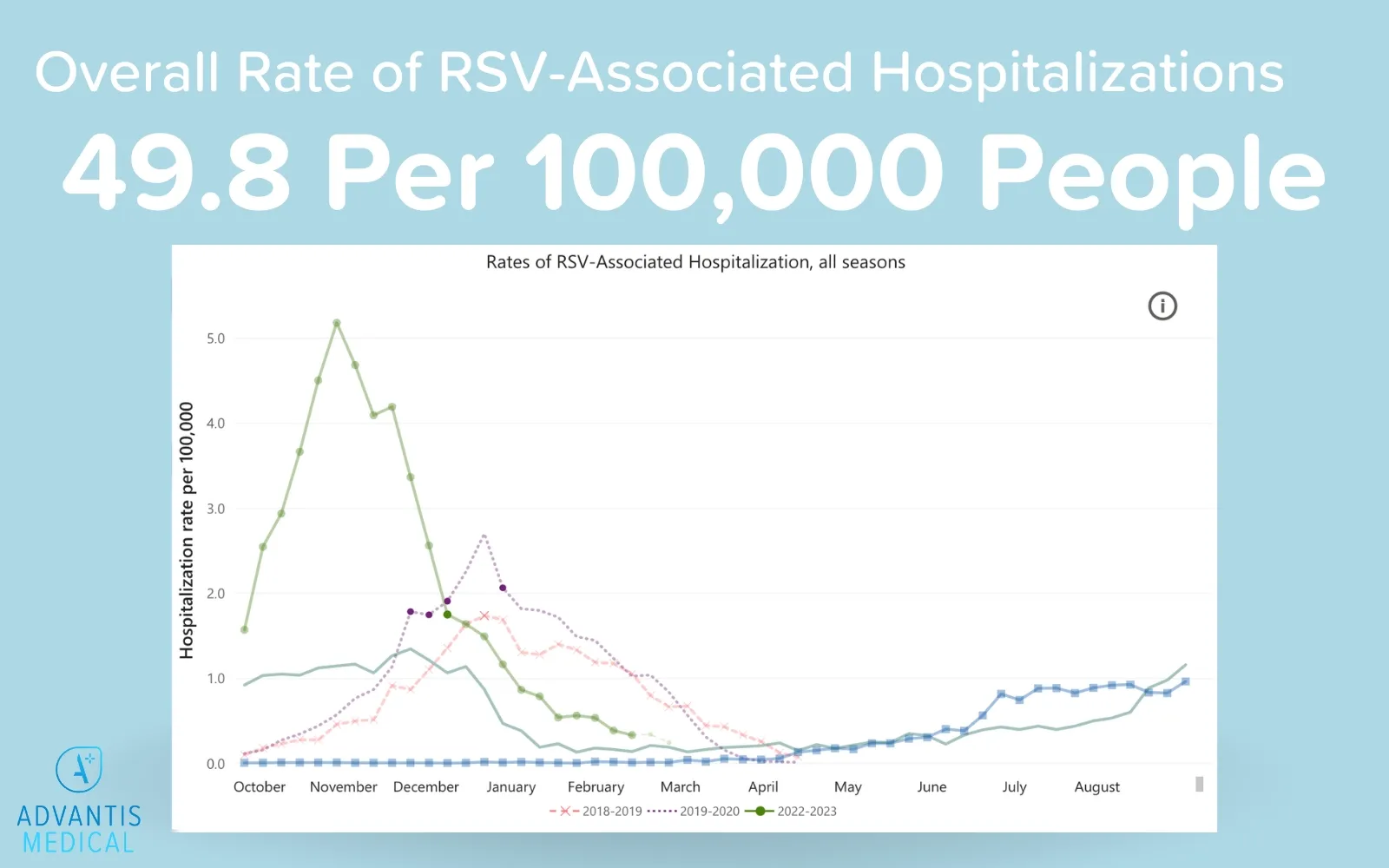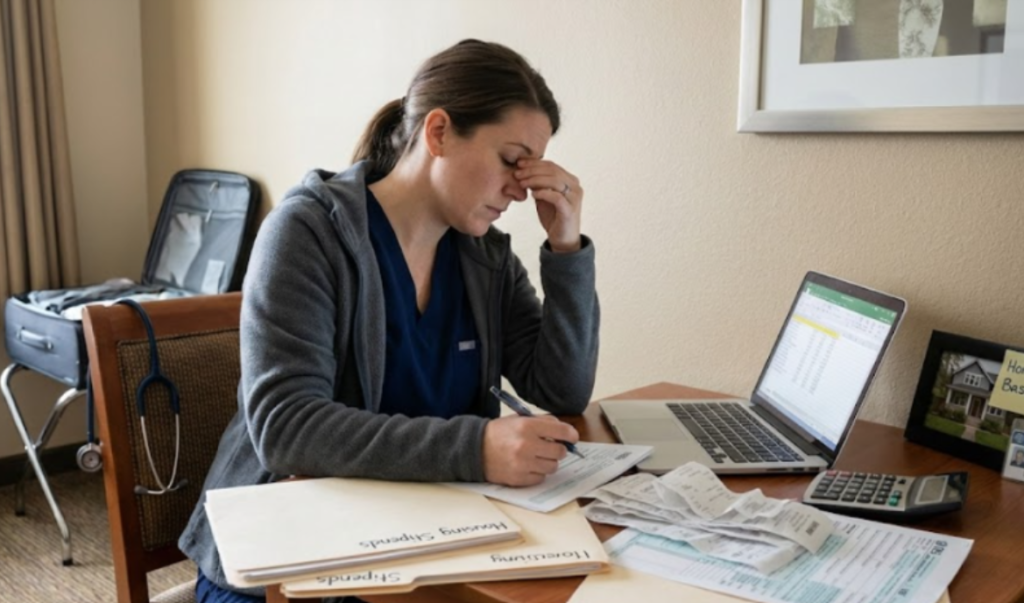It’s been nearly three years since the COVID-19 pandemic began, and things haven’t improved as much as many hoped. In fact, this winter we’re dealing with COVID-19, the worst flu season in years, and an unprecedented surge in respiratory syncytial virus (RSV) in a phenomenon experts have coined a tripledemic.
The tripledemic is putting the United States healthcare system under tremendous pressure. Inpatient hospital beds filled up with pediatric and geriatric RSV patients at the beginning of November. While there seem to be fewer RSV patients as we move into December, the flu surge is worsening.
Any relief hospital staff experienced from fewer RSV patients is being replaced with an influx of flu patients—but RSV is still sending children and seniors to the hospital in droves. And, unsurprisingly, hospitalizations are highest among children since RSV has historically caused serious illness for children under the age of five.
Since the youngest and oldest members of our community are at the highest risk for complications, people in other age groups need to be vigilant to prevent RSV transmission as best they can. Here’s what you need to know about RSV in adults so you don’t make your loved ones ill.
What is RSV?
Respiratory syncytial virus is very similar to the common cold in most cases. It’s a respiratory infection that attacks the airways and lungs, and it’s very common. In fact, most children have had a bout of RSV by the time they’re two years old.
Most people who get respiratory syncytial virus don’t need medical intervention. Over-the-counter medications and remedies to treat symptoms are usually sufficient.
Symptoms of RSV in adults
Like with any other illness, people who get respiratory syncytial virus can experience different symptoms. In mild cases of RSV, children and adults usually have a combination of cold-like symptoms that may include:
- Sore throat
- Runny nose
- Congestion
- Low-grade fever
- Headache
- Dry cough
Cough syrups, fever reducers, pain relievers, and other over-the-counter medicines can reduce the pain and discomfort of RSV symptoms to get you on the path to recovery. But sometimes, symptoms are much worse and require medical intervention.
Some people who get RSV have severe, life-threatening symptoms that land them in the hospital. It’s a serious situation regardless of age, but severe RSV is especially difficult for children younger than five years and seniors aged 65 and older. It leads to complications like pneumonia and swelling of the airways.
Signs of severe RSV include:
- Difficulty breathing
- Increased respirations
- Wheezing
- Inadequate oxygen levels leading to cyanosis
Anyone who experiences severe RSV symptoms needs immediate medical attention. The increase in patients experiencing these severe symptoms is causing chaos in emergency departments in many states.
Preventing RSV transmission

Hospitals are already buckling under the pressure of increasing hospitalizations in the wake of the tripledemic, so preventing RSV, flu, and COVID-19 transmission is a top priority. Taking deliberate precautions reduces your risk for illness and spreading these viruses to other people.
Here are several actions you can take to help avoid getting sick and making others sick too.
1. Get vaccinated
Vaccines are a great tool to prevent severe illness for many infections, including COVID-19 and the flu. Since both of these viruses mutate frequently, it’s important to stay up to date with boosters and seasonal vaccines each year.
The quadrivalent flu vaccine lowers your risk for getting sick in the first place. And if you do get sick, the symptoms are less likely to get severe. COVID-19 vaccines and boosters have similar benefits, especially with the newly released bivalent booster that is more effective against omicron variants.
There isn’t a vaccine for RSV yet, but scientists are working on it.
2. Stay home if you feel sick
Any time you feel sick, you should stay home. This is especially true for travel nurses and other healthcare professionals who have contact with infants, toddlers, and other patients who may be immunocompromised. It’s the best way to keep yourself from giving someone else a virus that could possibly kill them.
3. Wash your hands frequently
Handwashing is one of the best tools we have against respiratory viruses like COVID-19, RSV in adults, and the flu. When you wash your hands correctly—with clean, running water for at least 20 seconds—the soap and water kills the germs that cause these illnesses.
4. Carry hand sanitizer
Sometimes, you can’t make it to a sink to wash your hands with soap and water. As long as you don’t have dirt and debris on your hands, you can use hand sanitizer to clean them instead. Simply squirt some hand sanitizer in your hands and rub them together until the sanitizer dries.
This method only works if your hand sanitizer has at least 60% alcohol because alcohol is the active ingredient that kills viruses, bacteria, and other pathogens. Be sure to also check the expiration date of your hand sanitizer because it may expire.
5. Get an accurate diagnosis
If you start feeling under the weather this winter and you have cold or flu-like symptoms, it’s more important than ever to get an accurate diagnosis. You don’t want to make anyone else sick whether you have a simple cold or something more severe, but it’s important to track the spread of serious outbreaks of RSV in adults, COVID-19, and the flu.
The incubation and contagious periods of these illnesses also vary. And there are different treatments available for each. Getting diagnosed helps you protect your loved ones from getting sick. It also gives your healthcare provider an opportunity to treat you with antivirals and other medications like Tamiflu and Paxlovid to help you feel better sooner.
Get ahead of the tripledemic with Advantis Medical
Fall and winter outbreaks of respiratory viruses aren’t anything new, but this year things are different. Early onset of flu and RSV season are putting unexpected demand on healthcare workers and facilities across the US. It’s only a matter of time before nurses get sick, worsening the existing nursing shortage—leaving plenty of opportunities for travel nurses.
Find your ideal travel nursing job with Advantis Medical, and we’ll help you protect yourself throughout the tripledemic. We offer comprehensive health insurance, unpaid FMLA, vaccinations, and other benefits.
If you’re ready to join a travel nursing agency that puts your best interest first, we’d love to have you. Sign up on the AdvantisConnect job portal to get started!









